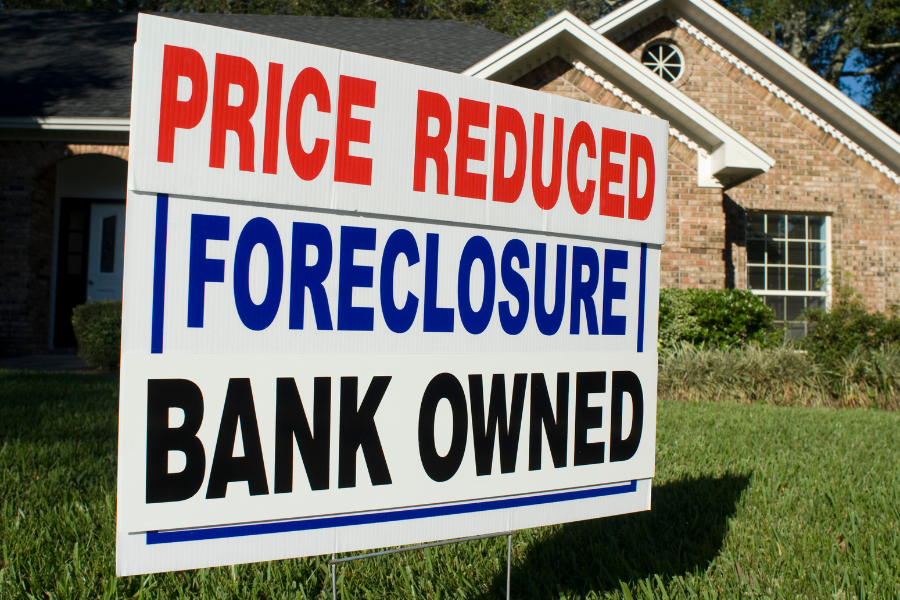The Role of Banks in Selling Homes: Exploring the Process
Banks play a crucial role in the process of selling homes. When a homeowner defaults on their mortgage or falls behind on loan payments, the bank may step in and initiate the foreclosure process. This involves legal proceedings and ultimately results in the bank taking possession of the property. Once the bank becomes the owner, they are responsible for selling the home to recoup their losses.
The process of selling bank-owned homes typically starts with an assessment of the property's value. Banks hire professionals to conduct appraisals and inspections to determine the market value and condition of the home. Based on these assessments, the bank sets a price for the property. Marketing efforts are then undertaken, including listing the home with real estate agents and advertising it through various channels. The goal is to attract potential buyers interested in purchasing a bank-owned property. Bank-owned homes can offer unique opportunities for buyers, but the process may be slightly different from regular real estate transactions.
Understanding the Options for Purchasing Bank-Owned Homes
Purchasing a bank-owned home can offer a range of options for potential buyers. One option is to buy the property directly from the bank through an auction or a traditional sale. These homes are typically listed by the bank on their website or through a real estate agent. Buyers have the opportunity to negotiate the price, submit offers, and potentially secure a good deal. Another option is to buy the home through a real estate agent who specializes in bank-owned properties. These agents can provide valuable insights into the market and guide buyers through the process of purchasing a bank-owned home.
Auctions can also be a popular option for those looking to purchase bank-owned homes. Auctions allow buyers to place bids on properties, often leading to competitive prices. However, it's important to note that auction purchases usually require cash or a certified check, so buyers should be prepared for this financial requirement. Additionally, buying a bank-owned home through an auction may involve more risks and a faster decision-making process. It's crucial for potential buyers to thoroughly research the property, set a budget, and have a plan in place for financing before participating in an auction.
Exploring Financing Options for Buying Bank-Owned Homes
When it comes to purchasing bank-owned homes, buyers have various financing options to consider. One popular choice is obtaining a conventional mortgage from a bank or a lending institution. With a conventional mortgage, buyers can secure financing for a bank-owned property by providing the required down payment and meeting the lender's eligibility criteria. This option allows buyers to spread out their payments over a predetermined period of time, making it more manageable to purchase a bank-owned home.
Another financing option for buying bank-owned homes is through a Federal Housing Administration (FHA) loan. FHA loans are insured by the government and often require a lower down payment compared to conventional mortgages. These loans are popular among first-time homebuyers and those with lower credit scores, as they offer more lenient eligibility requirements. By utilizing an FHA loan, buyers have the opportunity to finance the purchase of a bank-owned home with a smaller initial investment, making it a viable option for many prospective homeowners.
Factors That Influence the Selling Process of Bank-Owned Homes
The selling process of bank-owned homes is influenced by various factors that can significantly impact the overall transaction. One crucial factor is the condition of the property. Bank-owned homes are often sold in "as-is" condition, meaning that the bank does not typically make repairs or renovations. Buyers must carefully assess the condition of the property and consider the potential costs and efforts required for any necessary repairs or updates. The condition of the home can also affect its marketability, as homes in better condition tend to attract more buyers and potentially sell at a higher price.
Another factor that influences the selling process is the pricing strategy implemented by the bank. Banks generally aim to sell their properties quickly to recoup their losses, as they acquire bank-owned homes through foreclosure or default. As a result, these homes are often priced competitively or at a discounted rate compared to other properties in the market. The pricing strategy plays a significant role in attracting potential buyers and generating interest in the property. Additionally, banks may consider offers from buyers that are willing to pay in cash or provide a higher down payment, as these offers typically provide more certainty and speed during the transaction.
Debunking the Myth: Cash-Only Sales of Bank-Owned Homes
Cash-only sales of bank-owned homes have often been misunderstood and misrepresented in the real estate market. While it is true that some banks prefer cash offers, it is not the only option available for purchasing these properties. The myth surrounding cash-only sales can be attributed to several factors, including the perception that banks are resistant to financing and that cash offers provide a faster and easier transaction process.
In reality, banks are open to financing options for the sale of their owned properties. Many banks work with buyers who are pre-approved for a mortgage or have secured other forms of financing. This allows a wider range of potential buyers to participate in the market and increases competition, ensuring a fair and equitable sale process. Additionally, financing options provide more flexibility for buyers who may not have the full purchase price in cash but still have the means to make a down payment and regular mortgage payments. Therefore, debunking the myth of cash-only sales is essential in informing potential buyers about the available options for purchasing bank-owned homes.
Examining the Pros and Cons of Cash vs. Financing in Home Purchases
When it comes to purchasing a home, one of the first decisions you will need to make is whether to use cash or financing. Both options have their pros and cons, and it is important to carefully consider each before making a decision.
One advantage of using cash to buy a home is the ability to negotiate a better price. Sellers often prefer cash buyers as they can offer a quick and hassle-free transaction. Additionally, paying with cash eliminates the need for monthly mortgage payments, which can provide a sense of financial security. On the other hand, financing allows buyers to spread out the cost of the home over time, making it more affordable in the short term. This can be particularly beneficial for first-time homebuyers who may not have a large sum of cash readily available. However, it is important to note that financing a home purchase can come with additional costs such as interest payments, closing fees, and mortgage insurance. Considering your personal financial situation and long-term goals will help you determine which option is best for you.
The Importance of Pre-Approval for Financing Bank-Owned Homes
Pre-approval for financing is a crucial step when it comes to purchasing bank-owned homes. This process involves getting a preliminary approval from a lender based on your creditworthiness and financial situation. Without pre-approval, you may face various challenges and delays in the home buying process.
One of the main benefits of pre-approval is that it gives you a clear understanding of your purchasing power. By knowing how much you can borrow, you can set realistic expectations and focus your search on properties that fall within your price range. This saves you time, effort, and potential disappointment that may arise from falling in love with a property that is beyond your financial means. Additionally, pre-approval shows sellers that you are a serious buyer, increasing your chances of securing the bank-owned home you desire. Overall, taking the time to get pre-approved for financing sets you up for a smoother and more successful home buying experience.
Negotiation Strategies for Purchasing Bank-Owned Homes
When it comes to purchasing bank-owned homes, negotiation strategies play a crucial role in securing a favorable deal. Remember that banks are motivated to sell these properties quickly, but they still aim to maximize their return on investment. As a buyer, it's important to approach the negotiation process with a well-thought-out strategy.
One effective negotiation strategy is to thoroughly research the local real estate market and gather information about similar properties in the area. By knowing the recent sales prices of comparable homes, you can make informed and reasonable offers that align with market trends. Additionally, it can be helpful to work with a real estate agent who has experience in negotiating with banks. They can guide you through the process, provide insights, and help you craft offers that will be appealing to the bank.
Tips for a Smooth Transaction When Buying a Bank-Owned Home
When it comes to buying a bank-owned home, there are several important tips to keep in mind in order to ensure a smooth transaction. Firstly, it is essential to conduct a thorough inspection of the property before making an offer. Bank-owned homes are often sold "as-is," meaning the bank will not make any repairs or alterations. Therefore, it is crucial to have a professional home inspector assess the property to identify any potential issues or repairs that may need to be addressed.
In addition to property inspections, it is also advisable to have a clear understanding of the financial aspects of the transaction. This includes having a pre-approval for financing in place before making an offer. By obtaining pre-approval, potential buyers can demonstrate their financial readiness to the bank, which can increase the likelihood of having their offer accepted. Furthermore, it is important to have a realistic budget in mind and stick to it throughout the buying process to avoid any financial strain or unforeseen expenses. By following these tips, buyers can navigate the process of purchasing a bank-owned home with ease and confidence.
Exploring Additional Resources and Support for Buying Bank-Owned Homes.
Exploring additional resources and support when considering the purchase of a bank-owned home can be crucial to navigating this complex process. One of the primary avenues to explore is working with a real estate agent who specializes in bank-owned properties. These professionals have extensive experience in dealing with these types of sales and can provide valuable guidance throughout the transaction. They can help you identify suitable properties, negotiate on your behalf, and ensure that all necessary paperwork is completed accurately and efficiently.
In addition to working with a specialized real estate agent, it's also essential to tap into online resources and platforms dedicated to bank-owned homes. Numerous websites and online marketplaces cater specifically to this market, providing detailed listings, comprehensive property information, and even tools for calculating potential returns on investment. These platforms can help you streamline your search, save time, and gain access to a wider range of properties that may not be available through traditional listing services. Furthermore, some websites may offer educational resources, such as guides and articles, to help you better understand the ins and outs of buying bank-owned homes.




